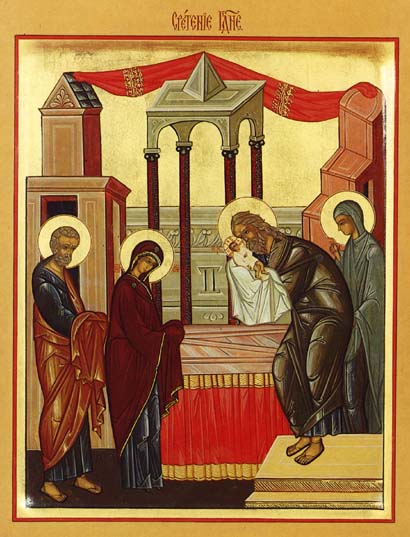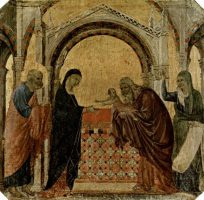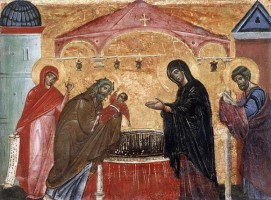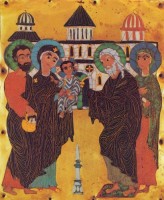On this festal day, brothers and sisters, the Holy Orthodox Church invites us all to share the joy of the Most Holy Theotokos and the Righteous Symeon the God-Receiver: “Rejoice, O Virgin Theotokos, full of grace, for from thee hath shone forth Christ our God, the Sun of righteousness.” The Holy Church will glorify and exalt the Most Holy Virgin with these words of the troparion yesterday, today, and on all subsequent days until the afterfeast.
Today we are all sharing the joy of the Mother of God and the Righteous Symeon by remembering that sacred event that once took place in the Temple of Jerusalem. From Holy Scripture we know that on the fortieth day after the Nativity of the Divine Child, the Most Holy Virgin and Joseph the Betrothed went to the Temple of Jerusalem in order to fulfill the Law by bringing their Child there. What kind of law was this that the Holy Family is now fulfilling?
We should all remember how once the Lord commanded His holy one, Moses the God-Seer, to bring the people of Israel out of Egypt. Those of us who have read Holy Scripture, who know the sacred history of not only the New but also the Old Testament, know how Pharaoh resisted this command of God, being unwilling to fulfill that for which Moses asked him. Not giving heed to the terrible punishment that fell on Egypt by God’s will, Pharaoh did not learn: he did not fulfill the request of Moses. The only thing that provoked Pharaoh finally to concede was the terrible sentence enacted against the entirely innocent firstborn infants of Egypt.
One night the angel of death slew several thousand infants. Pharaoh was horrified and all of Egypt shuttered, seeing in this the unstoppable hand of God. It was only then that Pharaoh decided to release Israel from Egypt. Once Moses had led his people into the Promised Land, the Lord commanded that every firstborn male child, as the possession of God acquired by the blood of the Egyptian firstborns, be sanctified and redeemed unto the Lord. This is the law the Virgin Mary was fulfilling. He Who was to sanctify and redeem all people was Himself first sanctified and redeemed unto God! “The Ancient of days, having become a babe, is borne into the temple by the Virgin Mother, fulfilling the promise of His own law” (kontakion of the feast); He is borne in order to fulfill “the Counsel of the Most High, ancient and true” for the salvation of man opened to him through the Most Holy Virgin Mary on the day of her radiant Annunciation. The Lord God accepts this only “mystical and perfect” sacrifice from His Son. This was the sacrifice on Golgotha, where the Lord was killed on the Cross for us and our salvation, to save mankind from sin, the curse, and death.
The Virgin Mary, with the Christ-Child in her arms, and Joseph the Betrothed were met by Symeon the God-Receiver and Anna the Prophetess in the Jerusalem Temple. The struggle of unceasing expectation was the life of the God-loving Symeon, who was vouchsafed a heavenly prophesy that he would not die until he saw the salvation of Israel, until he saw the Savior, Messiah, and Christ promised by the prophets (cf. Luke 2:26). He received this prophecy when – 250 years before the coming into the world of Christ the Savior – he, along with other translators, translated Holy Scripture from Hebrew to Greek for the Egyptian king. He was given for translation the book of the Prophet Isaiah, that Old Testament Evangelist who prophesied a great deal about Jesus Christ. Translating the place where Isaiah says a virgin shall conceive, and bear a son, and shall call His name Immanuel, which means God is with us (Isaiah 7:14), the Righteous Symeon thought that in all likelihood an error had crept into the text: a virgin cannot give birth, and if there is a birth, it is from a woman. He erased the word “virgin” and wanted to write the word “woman” in its place, but at that very moment an angel of God took Symeon by the hand and commanded him not to make this change. The truth of which the Prophet Isaiah spoke was indeed fulfilled and he, Symeon, would be a witness to its fulfillment, not dying until what was written had come to pass. Ineffable joy filled the heart of the elder Symeon when he saw the long-awaited Savior of the world.
But what keen vision would be needed in order to recognize in a tiny Child the promised Sun of Righteousness, the Redeemer of all nations! Symeon was very elderly and his bodily eyes were weak, but his spiritual vision remained untroubled because he had led his entire extraordinarily long life in purity and humility, full of love and trust in the Lord.
What an instructive lesson for us! Unfortunately, not only our physical vision but also that of our soul has been greatly blunted; sometimes we do not notice God next to us. Someone might say that he does much in life to meet God and to know God. But here, brothers and sisters, we must turn our attention to the following moment. Why did Symeon see Christ the Savior in the Child brought to the Temple? Because he was righteous in his life and had a pure heart – he was holy.
We often say that there is no deed greater than death for Christ. This is true, and it is no accident that the Church glorifies the holy martyrs. But when one looks at the image of St. Symeon, one sees here a different struggle accomplished by this man: he lived for Christ, he lived in expectation of meeting Christ. Sometimes we say: “Grant me, O Lord, to live a little longer.” The best thing we can wish one another is long life. But man cannot live long, above all, because of his sins. Illness, tribulation, troubles, and temptations beset man, and he cannot stand up under the weight of this burden.
Many of us have heard from certain people that they are tired of living and have asked God for death, because their soul is too weary and their body so ill: “Take me sooner, O Lord, from this earthly vale of tears!” But one does not find these words in the life of the Righteous Symeon, who lived not 60, not 160, not 260, but 360 years and, of course, was overcome by illness and the weakness of old age. But he did not complain, but rather desired to live for Christ’s sake. This is also a lesson for us, especially for those who have begun to tire of this life.
There is yet another significant lesson that we should learn from today’s feast day. The Holy Fathers bear witness to the fact that it is impossible to meet God in the afterlife if this meeting has not taken place here on earth. This means that I should make every possible effort to make this meeting take place in my earthly life. The Lord has done everything necessary for this. Somewhere in the depth of our souls we probably envy the Righteous Symeon, that at the end of his life he was finally able to meet our Lord Jesus Christ and even to hold Him in his arms. How we would have liked that! How we wish we could have been in the Jerusalem Temple then! Nevertheless, we present Christians – followers of our Savior, sons and daughters of our Holy Church – and much more fortunate than the Righteous Symeon and Anna the Prophetess.
Yes, the holy elder bore in his hands the Christ Child, but each one of us believers is given the opportunity to meet Christ not just once, and not just in the Temple, but in every place of our earthly existence. We are given the opportunity to have Christ in our hearts – and this is much more important. The Lord appeals to each one of us, saying: My son, give me thine heart, and let thine eyes observe My ways (Proverbs 23:26). He always seeks the human heart, going out to meet it. It befits us to hasten to Him both in joy and in sorrow. In joy we do this less often, while in sorrow we more frequently run to the Savior. The Lord approaches, and the weight of our life’s cross is lessened. In days of harsh reality, when life tests us, we should rush to Him: And call upon Me in the day of thine affliction, and I will deliver thee, and thou shalt glorify Me (Psalm 49:15), for The Lord is nigh unto all that call upon Him (Psalm 144:18).
The most important place for our meetings with the Lord is God’s church. Here, in every Mystery and in every prayer, a joyful meeting of God with man and man with God takes place. The Mystery of Baptism cleanses one of the ancestral sin, opening the doors of the Church to man and making him a Christian, a bearer of the name of Christ. In the Mystery of Chrismation grace-filled power is given, so that man would bear the name of Christ worthily, loftily, and sacredly. Unfortunately, however, we do not succeed in this; our lives have neither loftiness nor sanctity. Therefore the Church gives us another Mystery: through repentance one is able, as in a “font of rebirth,” to be cleansed of one’s sins and again worthy to bear the name of Christ.
Let us examine another Mystery, one that was just celebrated at the Divine Liturgy: the Holy Eucharist. What is this, if not my meeting with Christ? And not just a meeting: I take Christ within myself through the Communion given me under the form of bread and wine. And the other Mysteries? The Mystery of Matrimony sanctifies our family. The Mystery of Unction enables us to ask God for healing of soul and body. What grace-filled opportunities does Christ’s Church offer us! Yet the majority of people rarely make use of these opportunities (and many do not use them at all, unfortunately). We do not hasten to our meeting with God! We think that meeting God imposes certain restrictions on our freedom, and that I will not be able to do what I want. As such, I want to receive all good things here on earth, and not wait until the coming of eternal blessedness (and whether to expect it, I do not know); I do not want to labor for this, I do not want to deny myself everything.
It turns out that on such a wonderful feast day as this there are very few people in our Orthodox churches. In our city there are ten churches, and in each is a handful of faithful, but in a city of half a million ten handfuls is very, very little. For the heart of this people has become gross… and is not converted, that I should heal them (Isaiah 6:10). People do not wish to meet God! This is frightful, for if one does not meet God in this life then one cannot hope to meet Him after one’s physical death, in the life of the age to come. And if we cannot meet Him there, then what awaits us? A place without God, a place called hell. Could it really be that this is what mankind is preparing for? It is frightful to think so! The Feast of the Meeting of our Lord Jesus Christ reminds us of this time and again.
It is essential that we consider that our meeting with God takes place every time we perform any good deed. At the Dread Judgment the Lord will say to those standing on the right: For I was an hungred, and ye gave Me meat: I was thirsty, and ye gave Me drink: I was a stranger, and ye took Me in: Naked, and ye clothed Me: I was sick, and ye visited Me: I was in prison, and ye came unto Me. Then shall the righteous answer Him, saying, Lord, when saw we Thee an hungred, and fed Thee? or thirsty, and gave Thee drink? When saw we Thee a stranger, and took Thee in? or naked, and clothed Thee? Or when saw we Thee sick, or in prison, and came unto Thee? And the King shall answer and say unto them, Verily I say unto you, Inasmuch as ye have done it unto one of the least of these My brethren, ye have done it unto Me (Matthew 25:35-40). If we live this way, if we seek to see God in every person, no matter who this person is, then we will indeed not only worthily fulfill our Christian duty and obligations, but a meeting of the Creator with creation, of God with man, will also occur.
This is what the Holy Orthodox Church of Christ is today reminding us of time and again. May God grant, brothers and sisters, that having once met God in the Mystery of Baptism, that each one of us would not part from Him in all the days of our earthly life and the life of the age to come.As the hart panteth after the fountains of water, so panteth my soul after Thee, O God. My soul thirsted for God, the mighty, the living; when shall I come, and appear before the face of God? (Psalm 41:1-2). Let us pray for this to our Lord Jesus Christ. Let us pray to the Heavenly Queen, the Righteous Symeon, and Anna the Prophetess that, by their prayers and intercessions, the Lord would help us worthily to bear the name of Christian in this world, to take God into our hearts, and never to part from Him.
Translated from Russian.

















